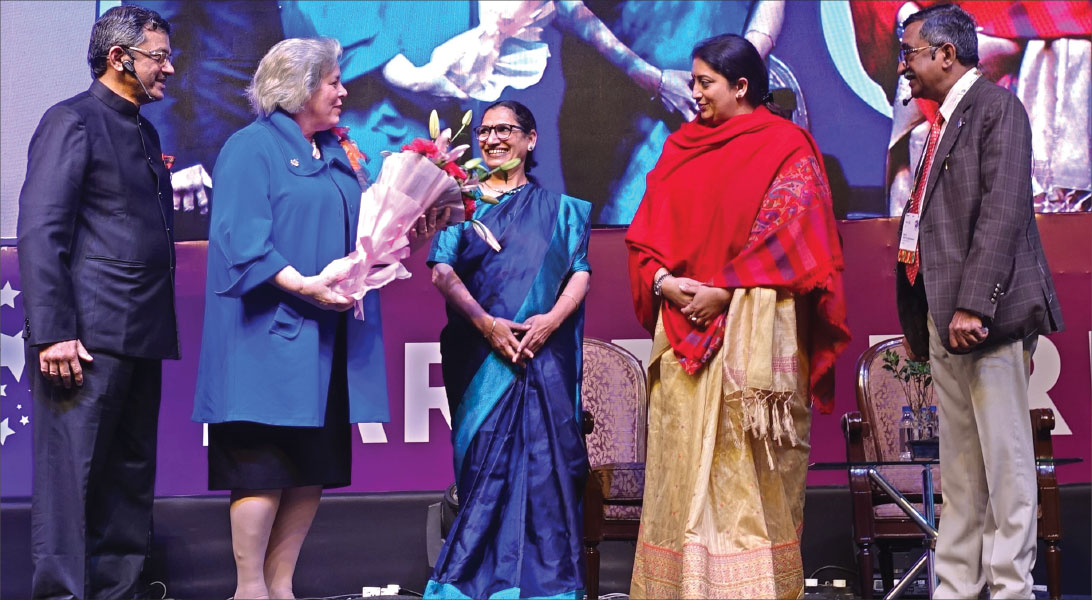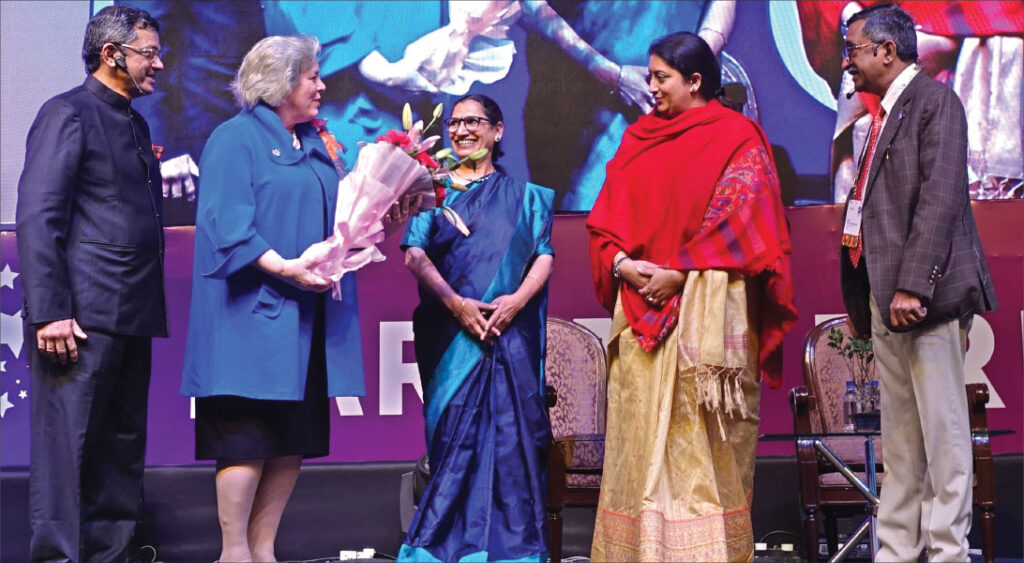
Coming as she did in the backdrop of a slew of violent acts of rape and burning alive of women, Union Minister of Women and Child Development Smriti Irani wowed the participants at the Indore Institute with her strident call for the urgent need for gender parity.
Answering a question from Convener and RI Director Bharat Pandya on a woman’s comment that ‘I always have to do my best, because if I fail people will say not I but women always fail’, she said, “Actually, a woman always has to do better than the best because if she fails, it is looked upon as a failure of both her gender and also the cause.”
Maintaining that there is this “ingrained bias against women” in our society, she gave the example of a Mumbai traffic jam, “where somebody will invariably say, aagey dekho (look ahead), surely a woman must have created this mess.”
Pointing to the two feisty women who were honoured at the Institute — Manasi Joshi and Triveni Acharya, she said people have to be reminded that such grit can be displayed by women in the face of huge odds. While Manasi, who lost a leg in a road accident eight years ago, had won a gold at the Para-Badminton World Championships in Switzerland, Triveni had rescued 5,000 women from prostitution. “People have to be reminded what it takes to be a woman in such a situation. Manasi dared to dream and Triveniben acted with courage so that others could dream. Both defined courage in their own unique ways. It is very easy to give lectures but very difficult to change a single life. And Triveniben has dedicated her whole life to rescuing girls trapped into prostitution, giving them an opportunity to live with dignity,” she said and asked the audience to give her a standing ovation.
What makes me tremble is that for the first time we have a national data base of convicted sexual offenders and there are over 7 lakh sexual offenders in that data base.
When asked by Pandya that these days it had become fashionable to talk about women’s empowerment, but did she believe that women wanted to be empowered by others, Irani recalled that in his introduction he had referred to Swami Vivekananda. “When a bunch of men walked up to him and said let’s all get together and think about how to empower women, Swamiji turned around and said who are you to empower women. Just give them education and they are capable enough to get empowered.”

But that being said, we need to ask if we can help the gender equity cause in our small ways. “Triveniben said how Rotarians stepped up and helped her in her cause. You may not have the time but you do have the resources to help, and such relationships have to be strengthened. Women have the capacity to work wonders, they need an opportunity and some space for themselves.”
When Institute Chair PDG T N Subramanian asked the minister how to change people’s mindset, as women required not favours, but opportunities, to go out and excel, and later the audience asked her about the increasing acts of sexual violence against women, Irani agreed and said gender inequity and violence against women existed not only in India but across the world. “I am happy that in India men are equal partners in this dialogue. We cannot make men the enemy.”
She raised an important point saying that as parents of both boys and girls, “we cannot abdicate our responsibility and blame the media, institutions, society, because we are the ones who make up society and are responsible for the way our children, particularly boys, perceive women. If we talk of parity and respect for women, we need to start from home, and admit that we are responsible for how our sons perceive women or how our daughters stand up for their rights. Triveniben walked up to her husband and made him a partner. And Rotary became her partner in helping the Rescue Foundation.”
If we talk of parity and respect for women, we need to start from home, and admit that we are responsible for how our sons perceive women or how our daughters stand up for their rights.
When a woman raised concern about the county not being safe for our daughters and what the government is doing about it, Irani quipped that the government had rape punishable by death penalty; “there can’t be a greater punishment. Also, we have set up 1,023 fast track courts.”
The government wants to ensure that any woman seeking justice has access to it in her own region. “But the challenge is that many women cannot afford legal fees, so if men like Mr Subramanian (lawyers), who are extremely expensive, can help even one woman, that is a change.” Apart from legal help, “such women need support to get back on their feet both financially and psychologically and if each of us can help even one such woman, that’s a huge contribution. But what literally makes me tremble is that for the first time we have a national data base of convicted sexual offenders and there are over 7 lakh sexual offenders in that data base.”

Coming down heavily on child pornography websites and calls for legalising prostitution, she said that one such website had over 5,000 consumers. “My question is who are these people who are consuming child pornography on this website? As for those who say that red light areas serve the needs of society and hence we should legalise prostitution, I ask what kind of society is it that makes a woman an object of sexual desire in order to serve its needs? All those who feel legalising these illegal acts of brutality against women will give women a safe environment against rape are inhuman in their approach towards women.”
Irani had the audience eating out of her hands through her sharp rejoinders, witty comments and humorous comebacks. To a question from one Rotarian on gender equity she asked about his profession and shot a counter question on whether he paid equal wages to his male and female workers. When he said “Not exactly, it depends on the scale…” she said, amidst applause, “There you are! One of the challenges women face is how to progress up the (corporate) ladder.” Employers need to ask themselves if they evaluated fairly the contribution of men and women at the workplace, the number of hours and the standards applied in things like extending deadlines, for both men and women.
It is easy to give lectures but difficult to change a single life. Triveniben has dedicated her life to rescue girls trapped into prostitution.
She cut short another long-winded question on so many educated and qualified women, such as chartered accountants, not being allowed to work after marriage and the need to “motivate husbands”, with a humorous: “I have to motivate husbands? I don’t know sir, why do you think I should motivate other women’s husbands… maybe because of the Tulsi role (in the popular Hindi serial Saas bhi kabhi bahu thi).” She added on a serious note: “The challenge we have is that women CAs often have to relocate after marriage and most of them don’t know how to restart their practices in the new place. If people in the same profession can help them, it would be great.”
Answering questions on literacy and building toilets in schools, she asked: “What help do you need? Tell me and it will be done.”
On equal opportunities, she said these exist in our country but the problem is in enforcement. Giving the example of 26 weeks maternity leave for child care, she said, “We found that one of the biggest media houses in the country, which was debating this issue on prime time, did not enforce it in its own organisation! So the government does make laws (for gender equity) but they have to be enforced.”
Pictures by Rasheeda Bhagat






